|
|
|
Sort Order |
|
|
|
Items / Page
|
|
|
|
|
|
|
| Srl | Item |
| 1 |
ID:
147189
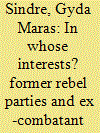

|
|
|
|
|
| Summary/Abstract |
An important factor shaping rebel-to-party transformations and post-conflict party governance pertains to how these groups relate to their former rank and file. While drawing on veterans of the war provides for stable source of support and organisational stability for the former rebel parties, ex-combatants may also pose challenges to such parties as they expect continued political influence, material rewards and social recognition for their contribution to the armed group. By identifying ex-combatants as a distinct interest group this argues that party-ex-combatant interaction directly shapes intra-party dynamics as well as policy formulation. Focusing on former rebel parties and ex-combatant interest group mobilisation in Aceh and East Timor, and this articles asks: How does rebel group mobilisation affect how former rebel parties mobilise political support? How do parties address and integrate demands made by ex-combatants?
|
|
|
|
|
|
|
|
|
|
|
|
|
|
|
|
| 2 |
ID:
147188
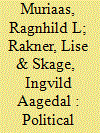

|
|
|
|
|
| Summary/Abstract |
The cases of the African National Congress (ANC) in South Africa and the Movement for Multiparty Democracy (MMD) in Zambia show major differences in the extent to which incoming ruling parties after a regime change build strong party systems. The ANC institutionalised a hegemonic party apparatus after coming to power, while the MMD did not. These differences, we contend, are related to the ANC’s history of a prolonged struggle that included violent conflict in contrast to the MMD’s peaceful pro-democracy campaign. Theorising this contrast provides a framework for investigating causes of different outcomes in party institutionalisation after regime change.
|
|
|
|
|
|
|
|
|
|
|
|
|
|
|
|
| 3 |
ID:
147191


|
|
|
|
|
| Summary/Abstract |
The aim of this article is to understand the socio-political evolutions in post-war Burundi, through the analysis of the individuals’ political mobilisation (both civilian and former combatants) and the dynamics of three party politics (Frodebu, Cndd-Fdd and Palipehutu-Fnl) in the aftermath of war. My purpose is to capture the viewpoint of individuals as party members, questioning how they get involved in politics, as well as to analyse how their partisan membership affects the political culture, the internal structure and the organisation of political parties. The article argues that mass violence (in 1972 and 1993) has engendered a political mobilisation process by drawing people into political life, encouraging the emergence of bottom-up democratic claims. The three political parties involved in this research have a different history, nature, development and position in the political chessboard which influenced the relationship between the leadership and the base, as well as their political attitudes.
|
|
|
|
|
|
|
|
|
|
|
|
|
|
|
|
| 4 |
ID:
147186
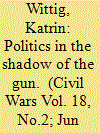

|
|
|
|
|
| Summary/Abstract |
This article provides a critical review of ‘rebel-to-party transformation’ scholarship. It shows how three flawed assumptions have underpinned much of the literature: (1) an ideal-typical differentiation between rebel group and political party as distinct by their use or rejection of violence; (2) the analysis of armed conflict as breakdown of ‘normal’ politics, and the study of ‘rebel-to-party conversions’ as a gradual, natural shift from violence back to politics; (3) a failure to integrate the study of rebel legacies into an examination of broader authoritarian legacies. These assumptions have clouded our understanding of politico-military organizations in conflict-torn societies, which combine social protest, armed rebellion, political violence, and party politics throughout their history. Drawing on the ‘no peace, no war’ and ‘armed politics’ paradigms, this article revisits these assumptions through the case of Burundi.
|
|
|
|
|
|
|
|
|
|
|
|
|
|
|
|
| 5 |
ID:
147185
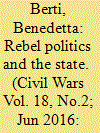

|
|
|
| 6 |
ID:
147190


|
|
|
|
|
| Summary/Abstract |
Armed groups often transform into political parties, which involves a profound transformation of the organizational culture. How these parties condition the continued political mobilization of their members is unclear. Using life history interviews with former combatants of the armed group M19 in Colombia, this article demonstrates what aspects of the party mobilize and stymie their political mobilization. Through exploring three typical political life paths – the Resilient, the Remobilized and the Removed – this article demonstrates the long-term challenges of post-war politics, the role of the party, as well as the personal journey from (war and) peace to democracy.
|
|
|
|
|
|
|
|
|
|
|
|
|
|
|
|
| 7 |
ID:
147184
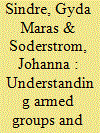

|
|
|
|
|
| Summary/Abstract |
Political parties with an armed history are not unusual, yet how these groups function in politics after the transition has largely been ignored. This special issue examines armed groups in party politics, using single and comparative case studies. The introduction forwards five recommendations for future research: (1) We need to see more comparisons across taken for granted boundaries; (2) the consequences for democracy should figure more prominently in our analysis of armed groups; (3) think more critically about standards and conceptual tools; (4) critically examine the interaction between levels of analysis; and (5) methodological pluralism would enrich the field.
|
|
|
|
|
|
|
|
|
|
|
|
|
|
|
|
| 8 |
ID:
147187


|
|
|
|
|
| Summary/Abstract |
Why do victorious rebels sometimes form powerful postwar political parties and other times collapse into weak, factionalized organizations? This paper examines cases of rebel victories in civil wars in Africa and traces the links between war duration, the extent of external intervention, and whether or not the war was fought in a compact area with the nature of the postwar political parties. It argues that protracted wars in confined territory with little external assistance have different organizational legacies than quick wars fought over expansive territory with significant international involvement. Four cases – Uganda, Ethiopia, Democratic Republic of Congo, and Libya – are used to illustrate the argument.
|
|
|
|
|
|
|
|
|
|
|
|
|
|
|
|
|
|
|
|
|